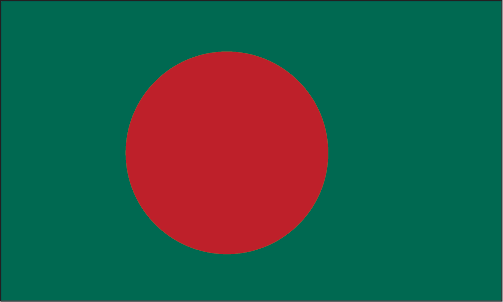
Source: World Bank
Communication Styles
Bangladeshis are quite implicit/indirect communicators. They tend to communicate in long, rich and contextualized sentences which only make sense when properly understood in relation to body language.
It is important for people who come from implicit/direct cultures to understand that their communication styles may be seen as rude and the information provided inadequate.
Personal space is less of an issue in Bangladesh than many European cultures. Bengalis stand close when speaking to someone of the same gender and touch is common.
However, when speaking with a woman the space is often increased.
Meeting & Greeting
Business etiquette in Bangladesh is reasonably formal. Proper behaviour is expected.
Men greet each other with a handshake upon arriving and leaving.
Foreign men should nod to a Bangladeshi woman unless she extends her hand. Businessmen should be addressed by the term "Bahadur" ("Sir"), while women may be addressed as "Begum" ("Madam"). This may be used with or without the surname.
Wait until your counterpart moves to a first name basis before you do so.
Business Card Etiquette
Business cards are exchanged after the initial introduction.
Educational qualifications are valued so include any university degrees.
Present your business card with the right hand.
Treat business cards given to you with respect. Merely glancing at it then throwing it on the table would be rude. Study it, comment on it and ideally place it into a business card holder.
Business Meetings
Meetings in Bangladesh are generally the place where decisions are disseminated rather than made.
They will usually be led by the most senior present who sets the agenda, the content, and the pace of the activities.
Meeting structures are not very linear in Bangladesh. There may be an agenda and a starting time, but they only serve as guidelines.
Completing a meeting fully takes priority over time and may extend well past any scheduled end time.
Meetings may commence with some small talk.
Communication is formal and follows a hierarchical structure. Deference to the most senior person in the group is expected. This is especially true when dealing with government officials.
One should never let their level of professionalism slip. Casual behaviour may be misinterpreted as a lack of respect.
Never lose your temper or show emotion. This may lead to a loss of face which will mean a loss of dignity and respect.
The need to avoid a loss of face is also reflected in communication styles. Rather than say no or disappoint people Bangladeshis will phrase sentiments in such as way that it is up to people to read between the lines to understand what is being implied. Phrases such as "we will try", "that may be difficult", or "we will have to give that some though" may really mean "this can't be done". . Therefore, it is important to ask questions in several ways so you can be certain what was meant by a vague response. Silence is often used as a communication tool.
Many people comment on the lack of smiles in Bangladesh. This has nothing to do with unfriendliness but rather related to the fact that a serious face is believed to demonstrate maturity.